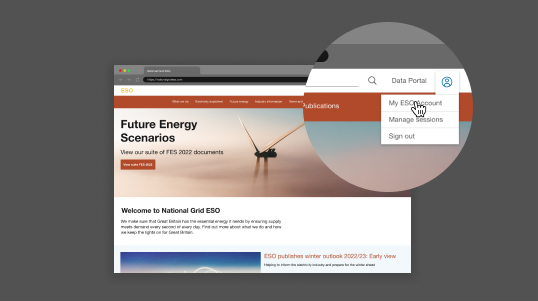
A day in the life of an Energy Trader
13 Oct 2020 - 4 minute read
Our colleagues are at the heart of the ESO, working hard to operate a safe and reliable electricity system, whilst supporting the transition to a greener, and more efficient system for future generations.
James Bradley gives us an insight into his time at the ESO and tells us what a Senior Energy Trader does.
When did you join and what made you decide to work for National Grid ESO?
I joined on the graduate scheme in 2011. I’d studied Mechanical Engineering at the University of Leeds, so it was a perfect fit.
My brother in law worked on energy projects with National Grid and was impressed with a number of the graduates he dealt with. He recommended the scheme to me, I looked online and applied. The rest is history!
The scheme was amazing and gave me the opportunity to see various parts of the business. I felt lucky to be able to get such a good overview.
I had the engineering knowledge but was able to gain experience in corporate strategy and I even undertook a secondment to Brussels to one of the European associations we work with.
I’ve done planning, regulation and then wanted a commercial focus so came in the Energy Trading team three years ago.
Can you tell us about your role as Senior Energy Trader?
I was aware of the energy trading team when I first joined and always wanted to work here.
We’re uniquely placed in that we undertake several activities. We work very closely with the control room, so we’re close to the front line which makes it exciting.
My work is what we call ‘within day’. 2-24 hours ahead so we’re close to delivery. We directly see the results of our work which motivates me.
Everything we do is commercially focussed so it’s easy to measure what we do. It means we can keep an eye on what we save for the end consumer.
As energy traders we must balance risk vs spend. Our aim is to operate a safe energy system at the lowest possible cost.
Most of our trades are with generators on the transmission network or with Europe via the interconnectors.
We have three interconnectors in the south east of England - France which is 2GW and Holland & Belgium which are both 1GW.
If there is too much or little power being generated, then we may trade electricity with Europe to help us to operate the system safely.
There was an example of this on 15 September – Wind was low, and it was a cool, bright day which meant demand increased due to heating. Some generation was still on outage from the super low demand periods of spring and summer so margins were getting very tight. France also had a lot of its nuclear fleet still non-operational and so was importing from us but we were able buy back power from France to increase our margin. It meant we had to spend a little more to buy a lot of electricity, but it made sure we maintained security of supply.
We’ve even had times of high wind generation, during storms, when we’ve had to sell power at negative prices to operate safely with sufficient downward flexibility.
We may also trade is there is too much flow in one area. This can happen in the south east because of the high energy demand in London.
How has the ongoing pandemic impacted your work?
Our workload mirrors the control room. We only have eight people, but we work 24/7 so it can be full on with long days, however the bonus is I only work four days a week.
We don’t tend to work nights, but I have one night a week when I’m on call.
Low demand in lockdown was hard for us because we had to preserve downward margins (making sure there is enough space on the system to turn generation down). As I’ve said we can also manage inflexible demand by selling power to Europe. Sometimes the size of Europe can help us. They are a much bigger inter-connected system than GB. For example, it might be windy in North Germany but 1000 miles away in Southern Italy it might not. it means as a single block it can more easily disperse excess generation than us.
I’m based in an office close to the control room.
We were fortunate because we work from home a lot when we’re on call. We always have a backup person on call in the day who works from home. If the trader for the day is stuck in traffic, the on-call person can take over from home. I found it a smooth transition to work from home all the time. MS teams has helped a lot to keep in touch with each other.
The pandemic has probably been more challenging personally but there have been some benefits. I have three kids so them running around at home can make it noisy on calls! The company has been brilliant at understanding we’re working from home with families.
I’ve found that people are sharing much more about their personal life since this pandemic began.
It’s actually been great to not commute! Instead of having a coffee break with my colleagues I can spend time with my wife and kids. It was never nice getting home after my kids were in bed.
